April 17, 2025 | 10:18 GMT +7
April 17, 2025 | 10:18 GMT +7
Hotline: 0913.378.918
April 17, 2025 | 10:18 GMT +7
Hotline: 0913.378.918
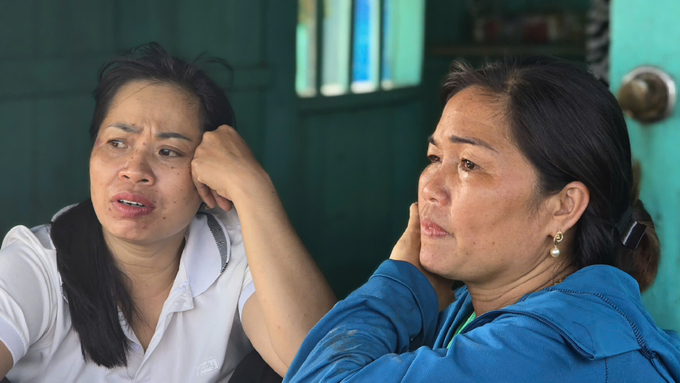
Ms. Nguyen Thi Tuyet (right cover) tells about the life-and-death moment when she jumped from one raft to another in the storm. Photo: Cuong Vu.
Mr. Tran Van Chuong will struggle to forget September 8 for the rest of his life. It was the day on which he and his wife narrowly evaded death, and it was also the day on which typhoon Yagi swept away the assets his family had saved for over two decades.
With more than two decades of experience in sea farming on Ong Cu island, Cam Pha, the man had never encountered a typhoon with such destructive force.
Mr. Chuong, his wife, and two laborers considered death while sitting on the raft. They were unable to receive assistance due to the level 14-15 winds. The raft's fish cages either had their nets torn by the breeze or broke at the bottom. The wind blew the fish in the enclosures away, much like leaves falling. Dispersed throughout the area were wooden planks from the raft and home. The only course of action available to prevent injury at that instant was for all four individuals to lie flat. Upon observing the raft drifting near the raft of another family, all four individuals resolved to cross.
The fish raft, which boasted fish valued at an estimated 10 billion VND, was the outcome of 20 years of diligent labor by Chuong and his wife, Tuyet. The number of fish cages has increased from a few to twelve. From a small raft to a substantial one. Upon the end of their regular living expenditures and debt repayments, they allocated all of their resources to sea farming. The raft continued to expand until it carried 200 containers of golden pompano and grouper.
The wild now contains 30 tons of grouper, with the tiniest weighing 3kg and the largest 8kg, as well as 40,000 golden pompano fingerlings that were recently released.
It was not exclusively Mr. Chuong's family. The situation was comparable to that of approximately 70 additional sea aquaculture households on Ong Cu island.
Mr. Chuong and his wife were somewhat complacent and did not return to shore while farming fish in the waterway, which was surrounded by dozens of large and small rocky islands. Despite the fact that Quang Ninh had implemented a sea ban, it was not uncommon for fishermen to find methods to remain on their rafts.
They were concerned that their fish would be stolen if the rafts drifted close boats or ships. This was not an uncommon occurrence, as fishermen from Thang Loi island, which was not far away, had also shared similar tales.
Mrs. Tuyet's family has been staying on a neighbor's vessel for the past few days. Fortunately, they had some money in their account, so she borrowed a boat to go ashore and extract cash. Both the Internet and phone signals were out of service, and communication on the island continued to resemble the past as of September 13th.
According to Mr. Chuong, recovery may require an additional two decades. The fishing couple, who originate from Quang Yen town, which is over 100 km away, have now acknowledged that sea farming is becoming more challenging.
Sea producers in Cam Pha and Van Don follow one approach: purchasing fish from anglers. Grouper is the most prevalent species, with an average price of 140,000 VND per kilogram for fish weighing 3-7 kg. Mr. Chuong stated that they simply purchase the fish and pray for the best, leaving the fish's survival rate to chance, as they have never encountered such a situation before.
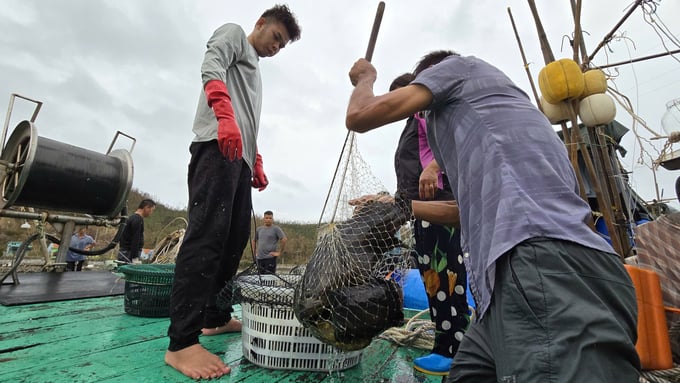
Fishermen retrieve grouper fish that were released into the sea after super typhoon Yagi. Photo: Cuong Vu.
Mr. Chuong rows his boat around the bay or out to the sea during the day in the hopes of finding buoys, nets, or pieces of timber for rebuilding the raft. Mrs. Tuyet awaits the arrival of vessels to sell fish at her home.
Typhoon Yagi caused sorrow for a significant number of people; however, it was also a fortunate event for the select few who transport passengers to the islands from Vung Duc port in Cam Pha. Numerous boatmen have adopted angling as a pastime since the storm dissipated and precipitation diminished. Some individuals were fortunate enough to capture hundreds of kilograms of fish in a single day, resulting in millions of dollars.
A family of three from Thang Loi island arrived this afternoon to sell fish to Mrs. Tuyet. Even though they had sold one hundred kilograms of fish, they did not grin. The middle-aged woman on the boat informed Mrs. Tuyet, "Our raft was entirely destroyed; otherwise, we would have retained it for the purpose of raising it." There were no negotiations between them; it appeared that the fishermen accepted the common price and shared the burden.

Fisherman Do Van Thuong and his wife said that although the storm swept away almost everything, they will still start over. Photo: Duc Binh.
The family launched their vessel and departed after selling their catch. Occasionally, all three of them cast a glimpse back at the raft where Mrs. Tuyet was living, their faces tinged with remorse. Before the typhoon struck, they also had a fish raft similar to this.
Two workers and Mr. Chuong worked tirelessly to untangle each strand of the net and reattach each nail on a section of the recently recovered fish raft. I am not in despair; I am not giving up. The intensity of their look was clear in each movement. The typhoon is now a part of history for the fishermen in Quang Ninh. Currently, they are making an effort to reconstruct their livelihoods using the nets and buoys they have collected.
Also, the neighbor who suffered fewer losses loaned Mr. Chuong the boat that he has been using for the past few days. They are not related, but they provide assistance to one another because, as the saying goes, "Out here in the vast sea, those who lost less help those who lost more."

Each grouper caught is a ray of hope for Mr. Thuong's family. Photo: Van Viet.
Typhoon No. 3 has resulted in damages for offshore aquaculture producers that exceed 2,200 billion VND, according to preliminary statistics from Van Don district. Shellfish losses in excess of 1,300 billion VND, sea fish losses exceeding 500 billion VND, and other seafood losses approaching 400 billion VND are among the anticipated losses. Furthermore, 318 floating houses were damaged, and nearly 90 boats of varying varieties were sunk or wrecked.
According to estimates, the typhoon caused damage to 158 out of 371 aquaculture facilities in Cam Pha City, resulting in a total loss of hundreds of billions of VND. As of September 11th, approximately 39 households in the coastal region of the city were able to salvage a portion of their fish cages, with damage spanning from 50% to 70%. The remaining 326 households experienced losses that were nearly complete. Notably, the majority of these households were cultivating high-value fish, including golden pompano, sea bass, and grouper, which resulted in substantial financial losses.
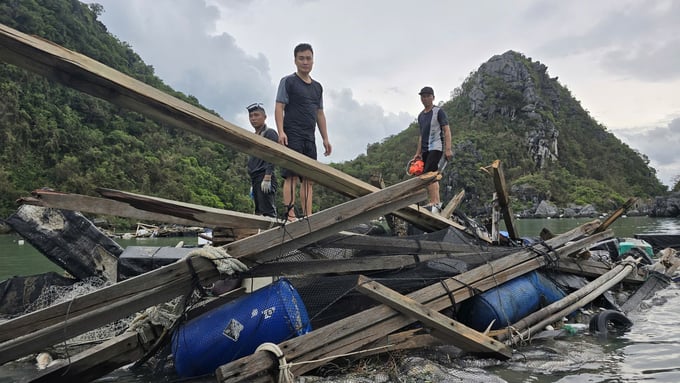
Super typhoon Yagi caused heavy damage to the marine farming industry in Quang Ninh. Photo: Cuong Vu.
The storm devastated all 800 oyster rafts and 1,700 fish cages owned by local households in Quang Yen Town. With sorrowful hearts, numerous individuals continue to attempt to venture out to sea in an effort to retrieve their final remaining possessions, which include oyster and clam ropes and wooden raft pieces.
The fishermen in Van Don, Cam Pha, and Quang Yen have experienced the most severe losses as a result of Typhoon No. 3. Some individuals suffered losses of hundreds of millions of VND, while others lost billions or even tens of billions of VND due to the surges. The sea continues to be congested in the wake of the storm. Some individuals have yet to return and are still AWOL. It is probable that the recovery of this critical maritime economy to its pre-storm condition will be a prolonged endeavor.
The damages to aquaculture activities are still being reviewed and assessed by localities in Quang Ninh, and they are also preparing for environmental remediation efforts in the near future. Additionally, they are striving to establish supportive environments that will enable individuals to resume their aquaculture careers as soon as possible.
Translated by Linh Linh

(VAN) During the working session with Deputy Minister Le Cong Thanh, Professor Francesco Corvaro, Italian Climate Change Envoy, reaffirmed Italy's commitment to supporting Vietnam in climate change response.
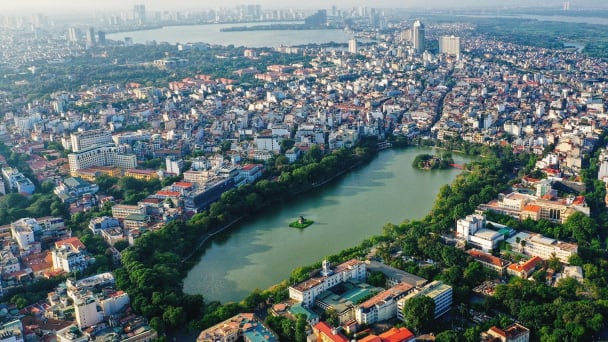
(VAN) After the merger, key leadership personnel of the provinces must consult with the General Secretary, key leaders, and the Standing Secretariat.
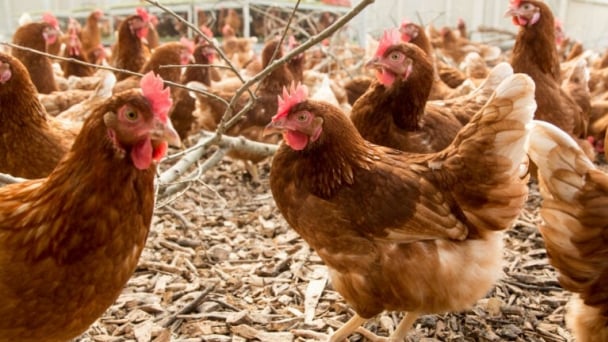
(VAN) The latest Business Benchmark on Farm Animal Welfare (BBFAW) reveals steady progress on farm animal welfare across the global food industry.
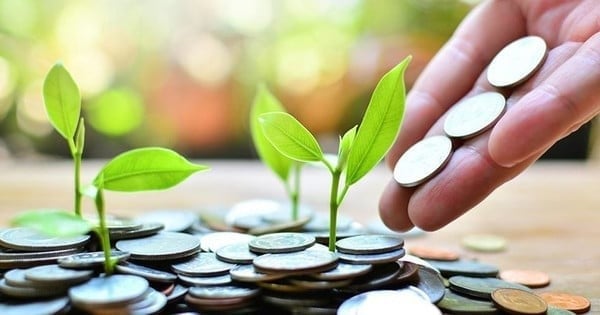
(VAN) Green credit is a financial policy that effectively supports environmentally friendly projects and activities today.
/2025/04/09/1049-2-165919_630.jpg)
(VAN) With a revenue of less than VND 30 billion/year, packaging producers are exempted from EPR liability under Decree No. 05/2025 newly issued.
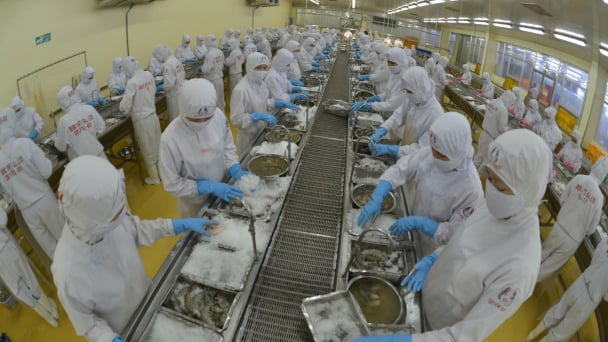
(VAN) Ministry of Agriculture and Environment has issued an Action Plan for sector's development in the coming period, aiming for a growth rate of 4% or higher and an export turnover of USD 65 billion.
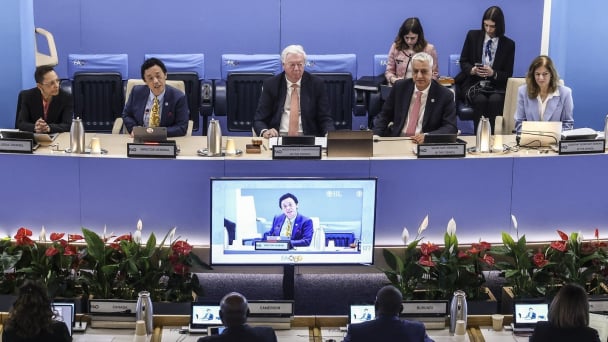
(VAN) The 177th Session of the FAO Council opened on Monday at the Organization’s headquarters in Rome.